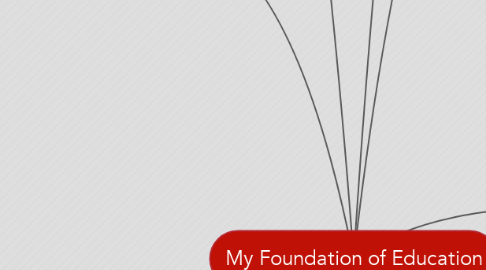My Foundation of Education
by Whitney Eason


1. Philosophy of Education
1.1. Idealism/Perennialism
1.2. Plato, Socrates
1.3. dialectic- used by Plato to move individuals from the world of matter to the world of ideas
1.4. Search for truth in ideas
1.5. Teachers ask question and lead class discussion of ideas
1.6. reminiscence- the role of the teacher is to bring out that which is already in the student's mind
1.7. Teachers serve as role models in the classroom, promote moral education and linking ideas to actions
1.8. Some lecturing, lots of discussion, analysis, synthesis, and individual research projects (oral and written)
1.9. study the past and classic works and apply to modern day society
1.10. Education is important as a means of moving individuals collectively toward achieving the good
2. Equality of Oppurtunity
2.1. Differs based on class
2.2. Education can be too expensive for lower class families
2.3. Lower SES means lower expectations for a students to finish school
2.4. The level of education of the parents can reflect the children's achievement
2.5. Teachers tend to label students on abilities (a.k.a. their social class) i.e. language usage of middle-class versus working-class
2.6. There is a direct correlation between parental income and children's performance on achievement tests
2.7. The proof of multiple studies challenges the belief in equality of opuurtunity
3. Politics of Education
3.1. Conservatives- William Graham Sumner, Adam Smith, Milton Freidman
3.2. Social Darwinist thought: Social evolution as a process that enables the strongest individuals or groups to survive, and looks at human and social evolution as adaption to changes in the environment
3.2.1. Individuals must compete in order to survive, and human progress is dependent on individual and drive
3.2.1.1. Included
3.2.1.2. Included
3.2.1.3. Excluded
3.3. Individuals have the capacity to earn or not earn their place in a market economy.
3.4. Capitalism is the most economically productive economic system and the system that is most respectful of human needs
3.4.1. Ronald Reagan championed a free market philosophy and argued that welfare state policies were at the head of an American uneasiness
3.5. Role of school is to provide the necessary educational training to ensure that the most talented and hard-working individuals receive the tools necessary to maximize economic and social productivity.
3.6. Schools socialize children into the adult roles necessary to the maintenance of the social order and transmit cultural traditions through what is taught making schools essential to economic productivity and social stability.
3.7. Progressive Vision of Education: schools are key in developing individuals to take action and solve social problems to continue a democratic society
4. Schools as Organizations
4.1. Teachers need technical expertise and human relations skills
4.1.1. Project specifications
4.1.2. End User requirements
4.1.3. Action points sign-off
4.2. roles include: colleague, friends, nurturer of the learner, facilitator of learning, researcher, program developer, administrator, decision maker, professional leader, community activist, caring-empathetic-well-rounded role model
4.3. Teachers must role switch ^^^^
4.3.1. Define actions as necessary
4.4. Key of teaching can be exercise of control in order to create oppurtunities for learning not to stifle
4.5. Teaching is very personal proffession
4.6. Teachers work for one big client, few opportunities outside of that
4.7. School based management is important but must be paired with proffesionalization
5. Curriculum and Pedagogy
5.1. Social Efficiency Curriculum
5.2. Different groups of students with different sets of needs and aspirations should receive different types of schooling
5.3. lead to development of standardized tests
5.4. Developmentalist Curriculum
5.5. Relates the curriculum to the needs and interests of each child at particular developmental stage and relates schooling to the life experiences of each child, making education come alive
5.6. Pedagogic Practice: Transformative Tradition
5.7. Believes that the purpose of education is to change the students in some meaningful way, including intellectually, creatively, spiritually, and emoionally
5.8. Governor: Robert Bentley; State Senator: Paul Bussman; U.S. Representative: Robert Aderholt; State Superintendent: Tommy Bice; State Board Members: Ella Bell, Jeffery Newman, Al Thompson, Betty Peters, Stephanie Bell, Yvette Richardson, Cynthia McCarty, Mary Hunter; Local Superintendent: Doreen Griffeth; Local Board Members: Steve Sides, Jason Neal, Suzanna Harbin, Brenda Howel, Kim Addison.
6. History of U.S. Education
6.1. Democratic-Liberal Schools
6.1.1. Materials
6.1.2. Personel
6.1.3. Services
6.1.4. Duration
6.2. expanded educational opportunities to larger segment of the population
6.3. Schools are not only for rich or privileged (conservative views)
6.4. Common School Era
6.5. education for women, african americans, created public high schools
6.6. equality of opportunity
6.7. Ellwood Vubberly, Merle Curtie, Lawrence Cremin
6.8. Cremin believed in more students from diverse backgrounds went to school for longer periods of time, the goals of education became more diverse, and social goals becoming more important than intellectual ones
7. Sociological Perspectives
7.1. Functional Theories Perspective
7.1.1. Dependencies
7.1.2. Milestones
7.2. stresses interdependence of the social system; examine how well the parts are intergrating with each other
7.2.1. Schedule
7.2.2. Budget
7.3. Emile Durkheim- first to recognize the sociology of education in late 19th early 20th centuries
7.4. Durkheim believed that education was of critical importance in creating the moral unity necessary for social cohesion and harmony
7.4.1. KPI's
